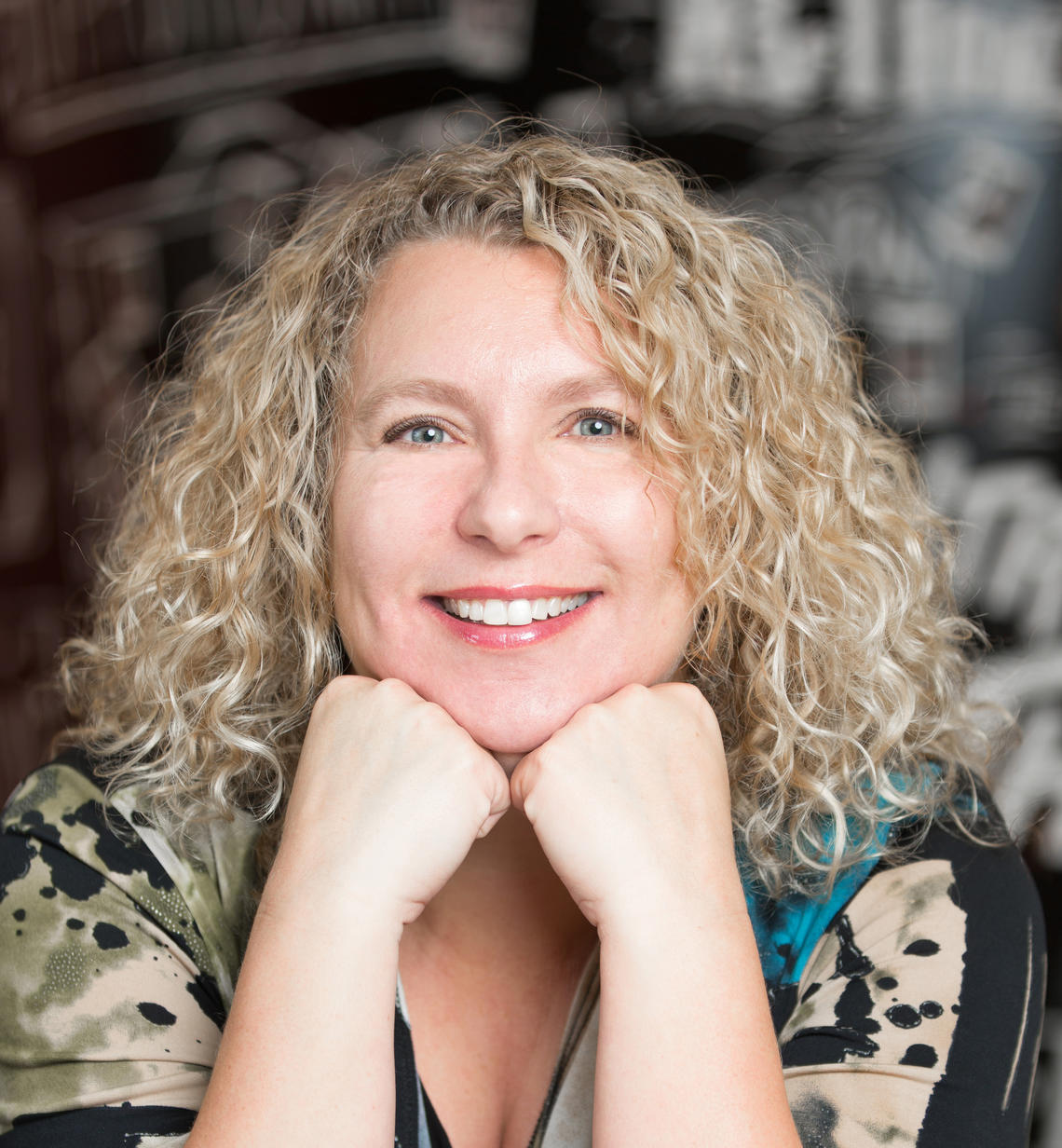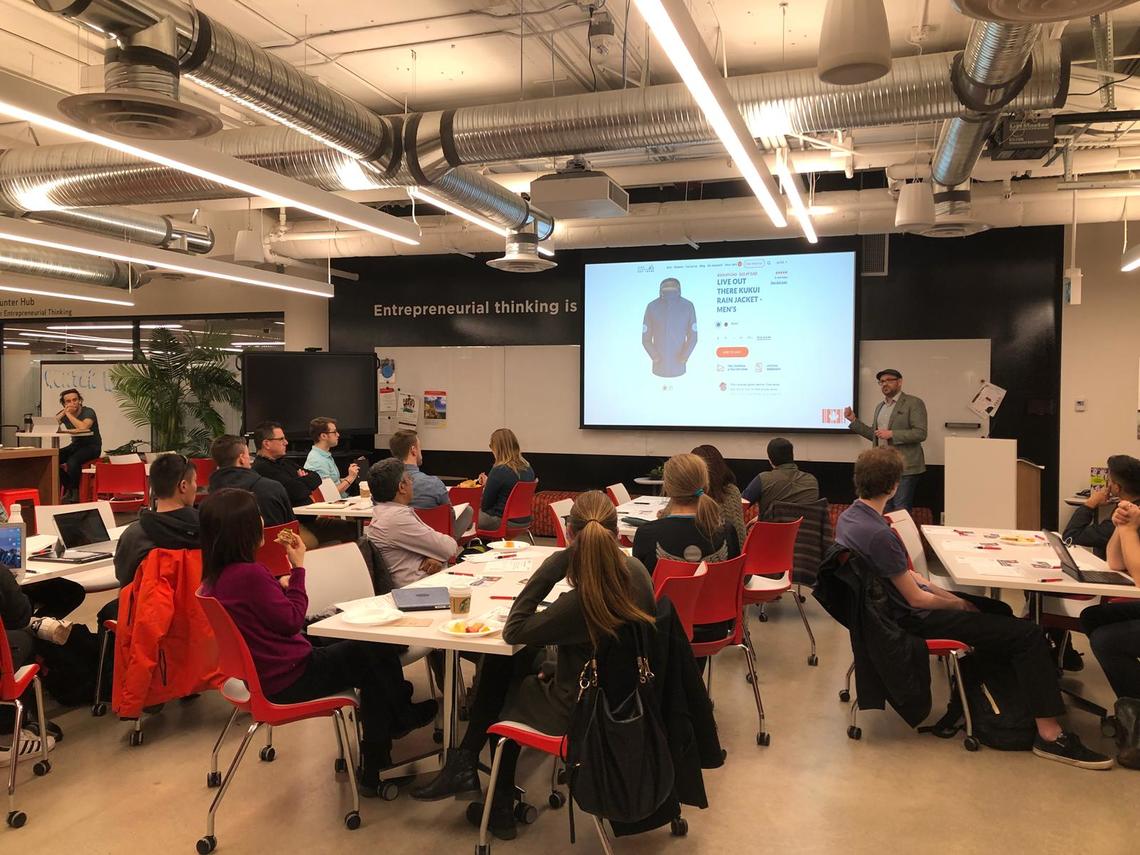March 11, 2019
What's on Joelle Foster's mind?

Foster celebrated one year as executive director of the Hunter Hub for Entrepreneurial Thinking.
Joelle Foster
Ever so slightly more than a year ago, Joelle Foster joined the University of Calgary community as the executive director of the Hunter Hub for Entrepreneurial Thinking. The Hunter Hub is an interdisciplinary nucleus supporting student experience and faculty and staff innovation —a place where entrepreneurial and innovative thinkers can come together to share ideas and best practices and to learn from each other.
It has evolved into a space where anyone can attend a range of events and activities, featuring speakers and subject-specific sessions. Popular workshops, conferences and casual mixers have all helped to create an environment where creative thinking, idea exchange and engagement thrive.
UToday recently sat down with Foster to talk about her milestone.
How was your first year?
It's hard to believe that a year has passed. It's true what they say, and that time flies when you are having fun! When I started, I had seven single-spaced pages of ideas. Dr. Ed McCauley, who was my boss at the time, was amazing; he let me fly with my ideas. Through that, I came to the realization that quality over quantity was a stronger method of initiation in order to create a solid base from which to build bigger and better things. It is about creating a culture of innovation within the university and building a new mindset. It has been incredible, crowdsourcing the collective brain trust in entrepreneurial ideation and thought leadership, and recognizing that all of us are greater than any one of us. At the end of the day, though, I just want to make a difference in our students’ lives.
Can you share info on some of the new programs in the Hub — some that perhaps were just ideas on paper a year ago?
The biggest pieces of the initial strategy were to create and foster interdisciplinary programs and relationships with all faculties and departments. The next was to become a hub for competitions.
We just created a new model of collaboration around the digital innovation emerging theme through our blockchain portfolio that involves multiple faculties. In addition to blockchain, we have created four other portfolios of interest (Health Innovation, Social Innovation, Energy, and Women in Entrepreneurship) to focus our activities. In addition, across the portfolios, we are integrating the UCalgary Indigenous Strategy.
Additionally, we have incorporated Theme Months to further focus events and initiatives. An over-emphasis on the venture-backed high growth entrepreneur often skews our perception of both the entrepreneurial person and the entrepreneurial process.
Because there are so many areas the Hunter Hub is involved in, it is difficult to highlight only one program or event. However, a major accomplishment is that we will be hosting the North America Innovation Academy (NAIA), a sister competition to the European Innovation Academy (EIA) in 2020. EIA is the world’s largest university startup incubator. Participants won’t need to start a business but the program will provide hands-on and real-world experience over a couple of weeks. The unique piece of this competition is that it is open to every faculty and really, focuses on having students form interdisciplinary teams, in order to nurture the different ways we think and collaborate.
You’re new to the post-secondary education environment: What has surprised you about students?
I worked with many students transitioning into entrepreneurship in my previous role as director at Futurpreneur Canada. The one thing that stayed consistent from that role to this is that students are full of drive and passion when it comes to their ideas. We have been working with students on innovative ideas in equine medicine to students creating an entrepreneurial program called Collegiate Entrepreneurs Organization (CEO). An example of utilizing our students would be the Campus MApp, multiple Computer Science graduates working together to develop an easier way to navigate around campus.

Workshops and presentations are offered regularly at the Hunter Hub for Entrepreneurial Thinking.
The Hunter Hub
What do people need to know about entrepreneurial thinking?
With the largest generation of young people now coming fully in the workforce at the very same time as a revolutionary age of technology, from artificial intelligence to the Internet of Things, this is starting to affect every job in countries globally. Those jobs will remain; they will just require different skills.
There is an unlimited global demand for those who can think entrepreneurially. This demand applies to students and those already in the workforce — whether they intend to work within an established organization, join the gig economy, or start a business of their own, entrepreneurial thinking is one of the most relevant skills for the 21st-century workforce.
Historically, businesses have placed value on stoicism, competitiveness, and adhering to company structure. While these traits are important, businesses are now also making an effort to incorporate qualities such as empathy, critical thinking, creativity, collaboration, resourcefulness, agility, and self-direction, all of which are encompassed by entrepreneurial thinking.
Traditional industries and large organizations are under unprecedented pressure: access to labour and resources is increasingly competitive, and startups are disrupting entire industries. That is why so many companies are looking to foster “intrapreneurship” and entrepreneurial thinking among employees — in other words, behaving like an entrepreneur within a large organization.
The difference between entrepreneurship and entrepreneurial thinking lies in the fact that entrepreneurship is about actions and intentions and entrepreneurial thinking is about attitude and beliefs, it's not necessarily bound to starting a business. Entrepreneurial thinking isn’t something that people inherently have or don’t. It needs to be developed, and in order to develop entrepreneurial thinking, you need to practise it. We assist in this development by establishing programming on campus that pushes our community to think experientially and interact with customers and collaborators face-to-face.
What are three of the biggest lessons you’ve learned through your first year at UCalgary?
First, it is so incredibly important to hire a diverse team of people with a growth mindset. It’s also imperative as senior leadership at the university that we become exponential leaders.
Then, it’s important to have a university-wide innovation strategy. For example, one of our portfolios is blockchain because entrepreneurs need to learn how to use this technology for business, specifically with relation to raising capital, enhancing supply chain management, allow crypto to run your ads and provenance tracking and more. Artificial Intelligence, or AI, I is another area of focus we will be pursuing because entrepreneurs should expect AI to be embedded in systems that deal with customers, suppliers, employees, machines, transport, and every other aspect of business activity.
Robots are coming but I don’t believe that they are going to take our jobs. We need to adapt as our occupations evolve alongside increasingly capable machines. Thus, we need to prepare our students. It is the role of universities to equip people with the skills to learn, and in turn, assist students in learning and adapting to how things change and evolve, and how they can fit into a new future. Machines do not yet have a capacity for creativity, innovation, or inspiration, and as such, human literacies like creativity, ethics, cultural agility, and entrepreneurial thinking as a whole, will keep us relevant.
Finally, the economy in Alberta is changing and diversifying, and it’s exciting. Calgary is on its way to becoming a true entrepreneurial city. Peter Cohan, the author of Startup Cities, indicates there are six factors that are needed: pillar companies, universities, human capital, investment capital, mentor networks, and values. We have all of these; we just need to work on further changing the culture and working together collaboratively. We need to grow the understanding that having a diverse economy is paramount to success.
Any final thoughts?
I look forward to the future of the Hunter Hub, and I encourage everyone to be sure to check out the Hunter Hub calendar for upcoming events, and remember to sign up for our newsletter to stay in the loop.
